Text
Understanding Obesity (Part 2): Whose responsibility for obesity?
Now that we know obesity is a public health crisis requiring urgent action, we may wonder - what causes it? After all, effective solutions require tackling the root causes of the problem. This part therefore aims to shed light on five of the many contributing factors to obesity.

1. Choices
Nothing much to elaborate here; choosing to eat more and moving less will result in weight gain. More calories in, less calories out - basic law of thermodynamics. Boring. However, many people are quick to go down the reductionist route by placing ALL the blame on the individual’s personal choices. If it’s just a matter of people needing to make the right choices, if it’s really that simple, we would have tackled obesity long ago. Blaming obesity solely on individual choices does not answer WHY we are increasingly eating more and moving less. Take a look at this timeline of adult obesity in the U.S below by the CDC, similarly reported in other countries across the globe.
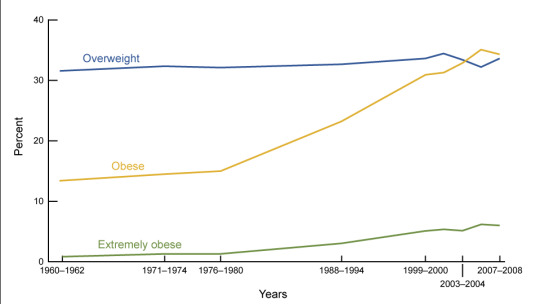
The rate of obesity has tripled worldwide since the late 1970s. If obesity is simply caused by a lack of personal responsibility, what happened in the late 1970s? Did everyone collectively lose their rationale - maybe everyone got together, decided to YOLO and go buffet in life? Definitely possible (cue the entrance of conspiracy theorists), but highly unlikely. Did some form of transcendent power strike the DNA of humans collectively that made us evolve into a bunch of lazier and much more ravenous creatures? Scientists have studied evolutionary changes during this period and concluded that nope, our gene pool has remained constant; any changes in the gene pool would take hundreds of years to produce an obvious effect across a global population anyway. This means that:
the global rise in obesity is not because of any significant genetic changes,
people did not willingly choose to eat more and move less,
there are other external factors that mainly drives the obesity epidemic.
Consider a class of 10 pupils. When only one pupil gets very low grades in an exam and the other nine got full marks, the one pupil is considered mainly at fault. Perhaps they need to study more and work harder to get a good mark. But when six out of ten got very low grades, is it still the pupils’ fault? Would we then tell the children to study more, while everyone else (i.e the teacher, parents, education system) just remain in inertia, or goyang kaki?
Similarly, when 63% of the people in Brunei are living with overweight and obesity -- is it still entirely their fault?
2. Environment
(Please bear with me, I’m trying my best not to turn this section into a whole thesis).

The environment is one of the largest contributors of the rise in the obesity epidemic. This is based on rigorous academic evidence and decades of research. Essentially, the environment has generally promoted the increased consumption of unhealthier food through a rapid increase in its:
availability : since the 1970s, the food environment underwent a shift from predominantly fresh produce to a more ultra processed diet. Food are being processed to the point where they look nothing like what they originally look like, stuffing them with cheap ingredients such as sugar, salt, trans-fats and flavourings to enable mass production to be sold at cheap prices and for easy consumption. These products are called ultra processed food, and examples include soda, sausages, nuggets, sugary cereals, instant noodles, crisps, chocolates and so on. Because of its poor nutritional profile, ultra processed food has confidently been associated with higher risks of obesity, heart disease, type 2 diabetes, cancer, depression, asthma, etc. And we, especially young people, are consuming more of this than ever.
exposure : we're talking about the aggressive marketing strategies that has been employed especially by the fast food industry and beyond. I remember going back home from the airport after my 14-day COVID quarantine being bombarded by roughly 10 billboard ads, majority of which are advertising for fast food. As I went out and about for the next few months, I realised that we are exposed to food companies constantly fighting for our attention through their advertisements, whether in the form of billboard ads, physical outlets, leaflets, newspaper ads, TV ads, social media ads, social media influencers, event sponsorships, - the list just goes on! In fact, 46% of the annual advertising budget in the UK goes to soda, confectionery and snacks, while only 2.5% goes to fruits and vegetables. Imagine if it was the other way around.. One can only dream... The point is, we as humans are constantly being tempted with unhealthier food rather than healthier food, which in turn, drives up our purchase and consumption of unhealthier food products. I also particularly like this photo taken in the UK that just showcases the pedestal unhealthier food ads are being placed on, i.e. same level as public health ads. Oh, the irony! (Good news for Bruneians - a code of conduct on responsible food marketing has been implemented recently to shield our children from these ads! Just what we need, priority on children’s health > anything else.)
portion sizes : certain food such as pizza and soft drinks underwent a significant increase in portion sizes from the 1970s to 2000s. Just a few days ago I went to to a fast food outlet and noticed that, as usual, the default drink choice is soda, but the default size is now the large one as compared to the smaller one that I remember seeing 3 years ago before I left the country. I was also informed that some other outlets have been asking customers to upsize their drinks by default. Just how necessary is this? We may think this is not a problem because people supposedly eat according to their physiological needs and can simply stop when they’re full, and so they wouldn’t need to finish the whole portion. But research leading to the discovery of what is known as the portion size effect (PSE) has suggested otherwise; the more energy-dense food people are served, the more they tend to eat.
The 21st century environment is also promoting physical inactivity and a sedentary lifestyle compared to the past centuries. Opportunities for physical activity especially in high-income countries have declined possibly due to the rapid urbanisation, rise in 9-5 jobs and more people relying on motorised transportation methods. Although research has shown that physical activity (PA) among adults done during free time have increased in the past ~30 years, a simultaneous decrease was found in physical activity done while working in the past ~50 years. Young people are also observed to be more physical inactive levels throughout the years, though locally... I like to think that our younger people are getting more physical-activity-conscious nowadays since applaudable efforts to widen opportunities for PA such as the launch of Bandarku Ceria and the opening of numerous hiking sites and gyms booming in 2019-2020. But this could just be my skewed perception looking at a small and specific demographic of the population - more formal research needs to be done.
So, we know that the environment is the main factor that drives up the obesity pandemic. But if we are all living in an environment which predisposes us to develop obesity, why don't we ALL have obesity? This tells us that there are other factors that makes an individual more likely to act on the environment's impulses - such as their socioeconomic status (income, education) and especially their genes.
3. Income
Research among developed countries such as the UK, Australia, Germany and Singapore has shown that people who are from lower income level are significantly associated with a higher risk of obesity. This graph below just shows how stark the inequality is between the most and least deprived areas of the UK. Note also how rapidly-widening the gap is over the years!
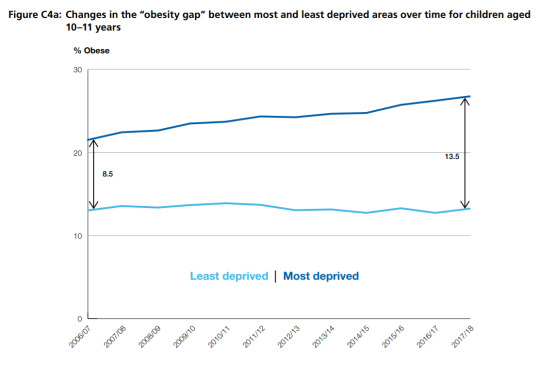
Why are poorer families in developed countries more likely to live with obesity?
Food that are more nutritious are often less affordable than nutritious food. I particularly love this infographic showing how in order to meet the general recommendation of a healthy diet in the UK, the poorer families would have to spend 39% of their income on food alone, while this percentage steadily decreases as your income increases, to as low as 8% for the richer families. The same pattern is reflected in many other countries including the USA, Australia and
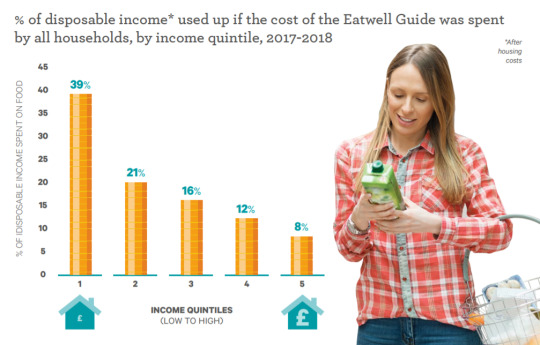
This inequality is not just seen within countries, but also across countries. One study across 18 countries identified that in order to meet the recommended guideline of 5 servings of fruits and vegetables per day, families in lower income countries would need to spend 52% of their income on them, those in middle income countries would need to spend 17% while those in higher income countries would need to spend a mere 2% of their income.
The price gap between healthier and unhealthier food can then affect people's purchasing behaviour, where families from lower income are forced to prioritise quantity of food over quality. For some of us, we are privileged enough to be able to choose food that are delicious, nutritious, and of different variety each time. But for some others, especially among families with poorer background battling food insecurity, they can only afford to eat in order to feel full and get through the day. Research has shown how poorer families always have to 1) balance out their choices of food with the utilisation of scarce resources, and 2) make judgment of food prices relative to other food prices. Combining this with the known fact discussed above that unhealthier food are FAR more aggressively marketed (almost 20 times more) than healthier food - we are left with a group of the population who are predisposed to choosing food that are mainly satiating, and less nutritious than the recommended guideline.
In fact, we know that even more factors than those discussed above can contribute to people from poorer families having an unhealthier diet. One of them is, on top of the price gap of groceries, we have the price gap of fast food. Parents who are busy and don't have much time to cook nutritious and homemade food often resort to fast food to sustain their family. Sure, we have a plethora of fast food options to choose from (and they just keep increasing - don't get me started). But what kind of fast food is both affordable and nutritious? Nasi katok costs $1 while a balanced meal costs $5 (minimum), and this disparity is seen all around the world.
Given all this, we still have the audacity to say that obesity is simply caused by a lack of willpower?
Gimme a break. It is clear that people who are not as financially privileged requires additional support in order to maintain a healthy weight. If not through finance, through education (further explained in Cause 4), or even better - both!
Side note: Despite the overwhelming evidence that having low income is associated with higher risk of obesity, there is also emerging evidence showing the possibility of the opposite (reverse causality); living with obesity is ALSO associated with having low income due to stigmatisation and discrimination. So basically... living with low income may cause people to live with obesity, and likewise living with obesity may cause people to live with low income. This syndemic is similar to the that of obesity and mental health issues discussed in Part 1.
4. Education
Health is not formally taught in most schools. Health starts at home. Because of this varying education level and awareness about health across the population, each family has very different approaches of ensuring how their family can grow up adopting healthy behaviours.
Generally, the likelihood of having obesity increases with decreasing level of education. This was observed in many countries including Taiwan, Saudi Arabia and Iran. The trend is similarly reported in OECD countries such as Australia, Canada, England and Korea as shown below.
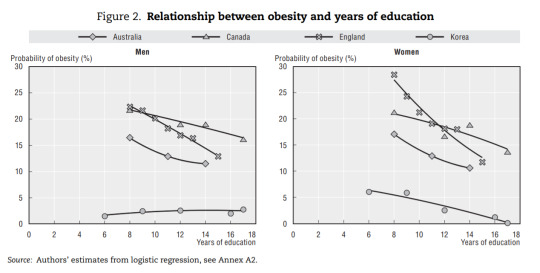
This may be because more educated families tend to have healthier lifestyles and are more aware of what the causes and consequences are of obesity. If a family is lacking awareness and knowledge on certain aspects of health, such as in nutrition - eg: what the importance of consuming enough fibre is, what exactly constitutes a balanced diet, how to cook nutritious meals under time constraint etc - then their family will be less likely to adopt healthy (protective) behaviours.
Awareness on the causes and consequences of obesity indeed remain low within many communities. In one study, 76% of young people surveyed believe that "obesity has a genetic cause and that there is nothing much one can do to prevent obesity". Almost 30% of them also believe that even when substantial changes were made to one's lifestyle, obesity cannot be prevented. In the UK, around 3 in 4 people didn't know that obesity can cause cancer - the leading cause of death worldwide.
Not only are people unaware of the causes and consequences of obesity, many people even show a general lack of understanding of obesity itself. It was found that among 401 Malaysians surveyed, 92% of those with obesity underperceive their weight, thinking that their weight is at a normal range or lower than it actually is. This is particularly concerning, because any intervention efforts to reduce obesity rate within a community will just bounce back by the majority of the target group who think the messages are 'not for them because they don't have obesity' when they actually do.
All in all, if you come from an educated family background - good for you. If you have the opportunity to study more about health, or human/medical sciences - good for you. But what about those who do not have all these privileges?
Side note: There is also evidence showing how having lower education level is not just associated with higher level of obesity in a direct manner, but also indirectly where having a low education level may contribute to households having a lower income, and as discussed above in No.3 -> may result in a stacked effect on obesity. This is called the mediation effect and more explanation can be found here (pg 133).
5. Genetics
Over 200 genes influence our body shape and size. This include genes that affects how frequently we feel hungry, the rate that we burn calories, our metabolism rate, and many more! Some of these individual genes can increase our likelihood of becoming heavier while some other genes tend to make us lighter depending on whether it is 'switched on or off'. And this mix of 'on and offs' for EACH gene is always going to be different between individuals (polymorphism).
Because of our own 'mixed bag' of ~200 obesity-related genes interacting with each other, some people will find it much harder to resist that bar of Kinder Bueno sitting on the cashier till, while some others wouldn't even bat an eye. Some people naturally feels full after a bowl of rice, while some others would need three bowls. Some people can store a large amount of fats while some others can store only half of that amount before those fats (lipids) seep into other tissues instead such as muscles and potentially cause diseases (lipotoxicity).
Our genetic differences within the population explains why some people respond differently to the obesogenic environment we live in. It is not as simple as our genes determining whether we develop obesity or not. We simply can't be saying "Oh it's in my genes, got it from my parents~" to justify our lack of effort to address obesity. There's no single gene that makes people develop obesity. But rather, our mixed bag of genes determine our susceptibility to obesity. For people with many of those genes that makes it likely for them to gain weight easily 'switched on' -> they will be more susceptible to obesity because their own biology makes it much harder for them to fight back the temptations of the obesogenic environment.
Because this concept is so difficult to be understood by people who have always had a healthy weight all their life, privileged with not having the genes raising the likelihood of obesity 'switched on' -> they tend to blame obesity solely on the individual's personal choice. Because their own biology makes it easier for them to resist the temptations of the obesogenic environment.
As Joslin - an American doctor - described almost a century ago which pretty much summarises the role of genetics in obesity:
Genetics probably loads the gun, while lifestyle in our obesogenic environment pulls the trigger for the spreading of the obesity epidemic.
Does this mean that people who have genes that makes it more susceptible to develop obesity can simply blame their genes for their weight?
No! Not entirely. They can and should apply the same general concept of weight loss to counteract the risk of obesity, i.e. - eating balanced meals, doing plenty of physical activity (going back to the boring law of thermodynamics: more calories out than in = weight loss). However, it will be especially harder for these people to achieve it due to their obesity-encouraging genes. They have to put in more effort to lose 1kg than someone with less of the obesity-encouraging genes.
What this means for those with obesity: Your own genes and biology is one of the factors why your BMI is considered high at the moment and why it feels so difficult to lose weight. It is important for you to understand this, so that you don't beat yourself up too often! It is not entirely your fault. It will be hard, and in fact it will be harder than many people, but what matters is for you stay focused in putting in the work to get there!
What this means for those with healthy weight: It's about time for you to stop blaming everything on the individual's personal choice when you don't even know how difficult they have it and how much they have been trying to fight their own biology. Don't act like you know their struggles just to shame and stigmatise them because you don't and neither do I. Leave it to their close family and personal doctor to consult them.
What this means for policymakers: We have a duty in making sure that 1) the environment is as conducive as possible to live a healthy lifestyle to avoid 'triggering the gun', and 2) people are aware that genes play a big factor too (of around 40-70%) in determining someone's weight and its not just entirely down to the individual.
Side note: The genetic explanation above which acknowledges the role of hundreds of different genes in the development of obesity is applicable to the majority of people living with obesity (polygenic obesity). However, there are also the minority of people who develop obesity due to mutation in single genes (monogenic obesity / syndromic obesity) which warrants a separate and more technical explanation.
Bottom Line
To summarise the cause of obesity:
As mentioned in Cause 1, how we develop obesity is always down to the individual eating more and moving less. But as explained in Cause 2, 3, 4 & 5, the complex interaction between the environment, the individual's socioeconomic conditions, and their own biology explains why it is so difficult for some people to eat less and move more.
To summarise the cause of the obesity pandemic:
Personal choice explains why one individual may develop obesity, but the environment explains why more people across the whole world is developing obesity. Our socioeconomic conditions and especially our genetics then explains why not ALL people develop obesity as a response to the change in environment.
So what should I do with all these information?
That's entirely up to you and how much you understood! But the reason why I brought this topic up is because I'm personally sick and tired of hearing people living with obesity being blamed for their "poor choices in life", "lack of self-control", for "being gluttonous", "lazy", etc.
As I have hopefully explained, obesity is undoubtedly very complex and a result of so many factors. These five things I mentioned above? There's. So. Much. More.
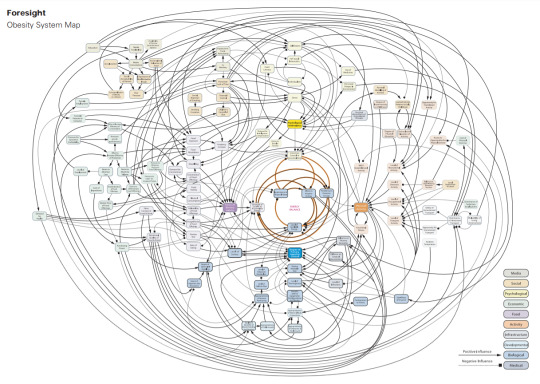
Click here for a clearer view.
So the next time we blame it all on people with obesity - check your privileges. You're rich? You're naturally slim? You're educated? You don't have as much obesity-encouraging genes? Good for you. Perhaps that tends to make you feel entitled to say that people who are living with obesity just needs to make "better choices".
But understand that you have it easier in maintaining your healthy weight, while people with obesity most likely have it harder. The least you could do is really be sympathetic and understanding, acknowledge their struggles, and certainly avoid shaming and stigmatising them. Make it easier for them by providing healthier choices and support them physically and emotionally in their goals of achieving a healthy weight!
Aren't you just giving an excuse for people to live with obesity?
Disclaimer: My BMI sits quite well on the healthy range at 23 kg/m^2. I am nowhere close to having obesity, nor do I have any family members, partners or close friends living with obesity. I literally gain NOTHING to be making up an excuse for people to live with obesity. Quite on the contrary, I understand its dire consequences as I have outlined in Part 1, and I have even mentioned personal choice as one of the causes above. It's not about giving excuses, but simply an effort to give voice and justice to those who has been silenced.
I hope I have gotten my point across through this post and the previous one in my Obesity Series! Let's all be more-informed members of the society and support each other in achieving our health goals :)
*Note: For simplicity purposes, ‘unhealthier food’ in this post refers generally to food lower in nutritional profile, and food high in fat, sugar and salt (HFSS). In reality, we should understand that food does not exist in a binary manner.
Unlinked References:
Gene Eating by Giles Yeo (Book)
CMO Independent Report: Time to Solve Childhood Obesity by Professor Dame Sally Davies
#obesity#brunei#child obesity#childhood obesity#causes of obesity#obesogenic environment#health#healthy lifestyle
6 notes
·
View notes
Text
Understanding Obesity (Part 1): Why worry about obesity?
In Brunei, 1 in 2 children are living with either overweight or obesity. This makes us top in ASEAN for child obesity. We have always strived to be top of the list, recognised in the region and all, but this is not really what we meant... It doesn’t stop there - the prevalence just keeps increasing over the years. If nothing is done soon enough, it won’t be long until we’re seeing a generation with more people living with obesity than those with normal weight. Adults don’t fare better as 63% of adults are living with excess weight (BMI>25), making us second in the region.
Why is this such an issue? Why can’t we just accept that people have different lifestyles, different body sizes, different composition of body fats, varying lifespan and so on? Why can’t we just embrace individuality? Why is obesity worth our undue attention?

Impact on Physical Health
Firstly, living with obesity poses threat to physical health by increasing their risk of developing a range of diseases, such as high blood pressure, type 2 diabetes, cardiovascular diseases, certain types of cancer, osteoarthritis (joint pain), sleep apnoea, chronic kidney disease - the list just goes on.
In children, their chances of developing asthma and musculoskeletal problems are doubled, T2 diabetes and hypertension quadrupled, and non-alcoholic fatty liver disease increased by 26 times. If not addressed effectively, they are likely to carry over the health conditions into adulthood. In fact, children with obesity are around 5 times more likely to live with obesity and its related comorbidities as adults. More recently, people living with obesity has also been shown to be twice more likely to be hospitalised with COVID-19 compared to those with lower BMI.
So it is rarely the case that obesity kills you. But rather, obesity skyrockets the chances of us developing these deadly complications. In fact, excess weight is one of the risk factors that ALL top three leading causes of deaths in Brunei share in common, i.e. 1) cancer, 2) cardiovascular diseases, and 3) diabetes.
I often personally hear people disregarding obesity intervention efforts with “I’m here for a good time, not a long time”. It’s used as song titles, printed on shirts, mugs, tweeted multiple times a day and glorified like an Aristotle principle. This implies that some people are fine with dying early, as long as they are happy. However, we have to be mindful of how these complications resulting from obesity does not just reduce our life expectancy, but mainly our healthy life expectancy (years of life spent in good health). Living with sakit lutut, four hours of dialysis thrice per week, insulin jabs, medications, fatigue - these all gives rise to a significantly poorer quality of life regardless of how long you live. One might then have to rethink that ideology.
Impact on Mental Health
Secondly, obesity also contributes to psychosocial challenges that a child or adult may face, such as:
stigma: overweight respondents were 12 times more likely, obese respondents were 37 times more likely, and severely obese respondents were 100 times more likely to report discrimination in the workplace
depression: being overweight in childhood was associated with increased risk of lifetime major depressive disorder
generally poor mental health due to binge-eating disorder, anxiety, low self-esteem and poor body image. Around 1 in 2 of bariatric surgery candidates report a history of mental health treatment.
Stigma and discrimination are pervasive among individuals with obesity who are frequently blamed for their excess weight. This argument is rendered justified by many as apparently ‘it may motivate individuals to adopt healthier behaviours’ (basically through a passive-aggressive approach). However, various research has shown that such theory is deeply flawed; direct and indirect stigmatisation towards individuals with obesity only further threatens mental and physical health, likely to adversely drive weight gain and only acts as a barrier for effective obesity interventions (here, here, here, here, and many more!!!). The rise in childhood obesity and poor mental health among children has thus been recognised as a syndemic -- two epidemics interacting synergistically and contributing to excess burden of disease within the population.
Impact on Economy
Lastly, the impacts of obesity extends beyond individual health and into the wider economy. It results in direct economic costs through substantial spending of healthcare services (UK example):
the NHS expenditure is almost double on each individual with obesity compared to those with normal BMI
estimated £5 billion per year spent on treating obesity and diabetes -- more than that spent on the police, fire service and judiciary system combined
Obesity also results in indirect economic costs extending beyond the healthcare sector, through productivity losses such as:
absenteeism: an individual with obesity takes an extra four days off per year. A total of 16 million days of absence due to obesity was reported in 2014
presenteeism: working while experiencing mental or physical health problems among individuals with obesity were reported to result in producing work of poorer quality and lower productivity in the workplace
Bottom Line
The consequences of living with obesity are not just limited to the individual’s physical health, but also their mental health and extends to the wider socioeconomic environment. Obesity has been formally classified by the World Obesity Federation (WOF) and World Health Organisation (WHO) as not just a disease, but also one of pandemic nature due to its widespread global burden. Unlike pandemics of infectious diseases where the impacts are sudden and stark - attributable to a single cause, the hidden pandemic of obesity is progressive and far more complex. It does not solely affect the respective individuals, but the whole population. It is what is known as a public health crisis.
This post might have sounded a little condescending, with me telling the world the dark side of living with obesity. Hold your horses -- please continue to read Part 2 as I talk about the causes of obesity, as only then can I convey what I am really trying to say.
* Some figures indicate relative and not absolute risk, so please interpret with caution.
** Main References:
Time to Solve Childhood Obesity An Independent Report by the Chief Medical Officer, 2019 (Professor Dame Sally Davies) https://assets.publishing.service.gov.uk/government/uploads/system/uploads/attachment_data/file/837907/cmo-special-report-childhood-obesity-october-2019.pdf
Gene Eating by Giles Yeo
Photo: World Obesity Federation
#brunei#obesity#childhood obesity#child obesity#asia#brunei darussalam#ncd#non-communicable diseases#brunei health#malaysia#indonesia#singapore#south-east asia#overweight#obesity cause#causes of obesity#nutrition#food#dietetics#health#healthy
3 notes
·
View notes
Text
Detox: Separating facts from fiction
All over social media and beyond, detox has been marketed as an act of ‘cleansing’ our internal body to make us ‘healthier’. The idea is that consuming certain food or beverage (e.g. cucumber water, kale smoothie) can supposedly wash toxins off our blood and organs which we have taken in from processed food and the physical environment. It is also claimed to aid with weight loss. This is mostly done complementary with diet restriction and/or a shift in lifestyle for the better. People who advocate for it range from entrepreneurs to self-proclaimed ‘wellness gurus’.
What motivated me to write this is because I have seen social media posts based in Brunei promoting the purchase of detox drinks, promising weight loss and a toxin-free life. It has been heavily marketed and many people put trust in it.

So how true is this claim?
Short answer: The role of detox in delivering its marketed benefits is NOT SUPPORTED BY SCIENTIFIC EVIDENCE.
Long answer:
First - what exactly are the toxins meant? This information is usually missing from detox ads; this is already a red flag if we bother to critically analyse health claims shoved into our faces. By definition, this would imply hazardous things we could ingest unknowingly such as mercury in seafood, cigarette smoke, pesticides, ammonia in cleaning agents, lead from fresh paint and apparently this also includes “toxins from processed food” - whatever that means.
Detox advocates would claim their diets and products can flush these toxins off our body. However, there is little to no evidence from the scientific literature that detoxing can remove ANY toxins from our body. We have to remember that our body is created in a beautifully complex way to ensure that we are always in optimal health, so much so that we have our own internal detox system. Our primary detox organ - the liver, along with the kidneys, our immune system and other organs are always working to eliminate any harmful foreign substances from our body. A couple of example includes:
The urea cycle: Ammonia in the body which is highly toxic when accumulated is converted to urea in the liver, then transported to the kidney and excreted through urine.
Metallothioneins: Our liver and kidneys produce these proteins which neutralises harmful metals such as lead and mercury to prepare for their elimination from the body.
Although there are other exceptional harmful compounds that cannot be removed by our natural processes as quickly such as bisphenol A (BPA), there is absolutely no evidence that detox diets can eliminate them at all.
So there really is no need to invest so much $$$ in something that basically has zero evidence. Instead, we should focus on maintaining a generally healthy lifestyle to ensure our organs are working at an optimum level to naturally flush said toxins out.
How about weight loss - why do people report losing weight very quickly following a detox diet?
Again, there is virtually no scientific evidence that detox causes weight loss. Quoting Klein & Kiat (2015) in their review of evidence: “..no randomised controlled trials have been conducted to assess the effectiveness of commercial detox diets in humans.” If it really is effective, healthcare providers all around the world would be scrambling at their feet making detox juice in and on every corner to prescribe it to patients living with obesity.
Even when people do manage to shed some KGs, this is an inevitable consequence of the very-low-calorie diet that is practised with the detoxing process. This happens because when we drastically reduce our caloric intake like such, the body will start to look for sources of energy. First, it will break down our carbohydrate storage first (called glycogen), which was initially stored coupled with water in an around 1:3 ratio. Once the glycogen is broken down into glucose, the water stored with it also gets taken away too! And hence, the weight loss that people see is therefore attributable to water weight instead of fats. This weight is usually regained quickly after getting off the detox diet, proving that it is not a sustainable option to lose weight in the long term.
Quite the contrary, maintaining this diet with calorie restriction poses risks to our health. We deprive ourselves off protein, good fats, other vitamins and minerals as well as many essential nutrients that otherwise would have been obtained from a balanced diet.
We should instead focus on maintaining a generally healthy lifestyle such as through eating nutritious food with the right portions and engaging in physical activity. Yes, this is a running theme across this blog but it really is the most reliable, safest and sustainable option to lose weight. Most importantly, it is supported by scientific evidence. In a world saturated with misinformation and pseudoscience, we should stick with proven advice that has been around for some time and not look for unproven passing fads and quick-fixes.
So should I avoid detox?
It should be noted that this article denies the claim that detox diets live up to its marketed benefits. This doesn’t mean that we shouldn’t consume detox products, but simply, we shouldn’t expect any magical phenomenon to happen afterwards. If you would like to consume, say - cucumber water, do so because you like the taste or you would like to make a switch from the relatively more sugary soda, and NOT because it flushes your toxins out or helps you lose weight. Because it doesn’t really...
The next time you wanna spend a hefty sum of money on some lemon-infused oxygenated detox water with cayenne powder and al dente blue spinach, do yourself a favour and rethink your choices - you might just end up saving that $10 for something more evidence-based!
Main References:
Detox diets for toxin elimination and weight management: a critical review of the evidence (Klein & Kiat 2015). https://pubmed.ncbi.nlm.nih.gov/25522674/
The dubious practice of detox (Harvard Health Publishing 2008). https://www.health.harvard.edu/staying-healthy/the-dubious-practice-of-detox
Do Detox Diets and Cleanses Really Work? (Bjarnadottir 2019, Healthline). https://www.healthline.com/nutrition/detox-diets-101
Fasting - the ultimate diet? (Johnstone 2007). https://pubmed.ncbi.nlm.nih.gov/17444963/
Science Explains Why You Lose Water Weight (Helmenstine 2020, ThoughtCo). https://www.thoughtco.com/science-explains-why-you-lose-water-weight-4102879
#brunei#detox#detox juice#asia#detox products#detoxification#detox myths#pseudoscience#mythbusting#brunei darussalam#brunei blog#facts#science#biology#nutrition#dietetics#food#healthy#health#healthy food
2 notes
·
View notes
Text
Eatwell Directory (Brunei)
Healthy home-cooked meals should be the preferred option in our diet. This is because by eating out, we do not have control over the calories, what kind of ingredients were used, how much salt are added and so on. A UK research (1) has concluded that calories from main meals in restaurants tend to be excessive, often even higher than fast food meals. Out of 1,226 dishes sampled, only 9% are in line public health recommendations. They also tend to be very high in salt, sugar and fat when compared to homemade food (2).
As a consumer, it can be difficult to measure the calories of each meals . However, one thing we can easily measure is the food portions according to the main nutrients (carbohydrates, proteins, fats etc). Below is a list of food establishments in Brunei specialising in food products which follows the recommended portions based on the Eatwell Guide published by Public Health England (PHE) in 2016 (3). This does not imply that the food served are healthy, as per outlined earlier, we do not know things like the quality of ingredients and quantity of salt, sugar and fats but it does indicate that these establishments serve most of their meals with healthy portion sizes. This list would be useful when we find ourselves short of time or resources to cook homemade food!
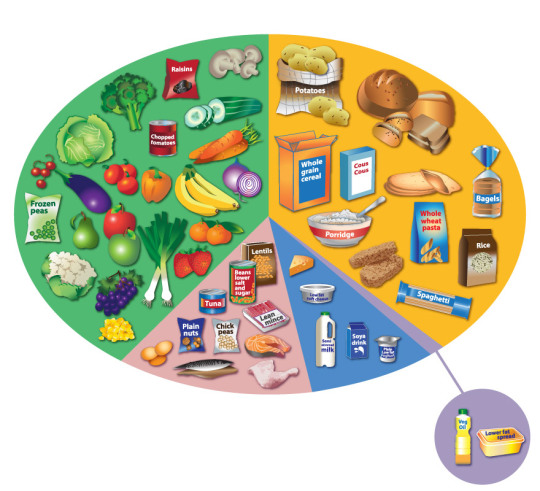
Fuel’d (Serusop, Kiulap)
Roots (Gadong)
Pan & Wok (Airport Mall, Centrepoint, Delima, Bunut)
Eat Well Co (Jerudong)
HealthyFoodBSB (Online)
Nectar Food Company (Online)
0 notes
Text
Responsibility of families in children’s health
Opportunities to promote health among children are met with overwhelming challenges. The fast-food industry, for instance, is growing faster than ever, proving to be detrimental when consumed in excessive quantities as the food tend to be loaded with sugar, salt and LDL cholesterol — all of which contributes to ill health. Adding fuel to the fire is their aggressive marketing strategies, where 91% of expenditure spent on food advertising is on unhealthy products such as sugary drinks, cereals and fast food; with a devastating $1.8 billion per year aimed at children and teens (1).

In order to avoid the public from falling into traps of these industries, it is best to inculcate healthy behaviours early in our lives, i.e: during childhood. Childhood is the time when kids are still learning to differentiate between the good and bad. In line with the model of health-promoting family proposed by Christensen (2003), the family health practices — including traditions around physical activity and diet — is at the centre and directly affects the children’s health. See the model here.
It is important for parents and families to practice exemplary health behaviours so that the child grows accustomed to practise it themselves. Parents are indeed children’s biggest role models.
0 notes
Text
The Smoking Stigma
[OPINION] People often hold strong prejudice against cigarette smokers. In reality, there are various social factors that may drive an individual to smoke. An example may include growing up in a family of smokers and lacking knowledge on its consequences — to which they could end up being addicted to it. One should not therefore assume that smoking is always solely out of a person’s own will.
We obviously should not abolish zero-tobacco policies and stop awareness campaigns on the risks of smoking to the public because of this reason, but it’s the stigmatisation and the act of shaming which needs to be stopped. Adult smokers mostly already know the harmful effects of smoking and yet find it difficult to quit. We therefore should find ways to help them instead, especially if they are our friends or family members who definitely could benefit from having a strong support system. It is also vital that smoking cessation services continue to run and on top of that — smokers should constantly be signposted to the service and improving its effectiveness should always be researched on.
I hope one day to see smokers living in a society where they are guided to quit rather than blindly patronised.
Pic attribution: <a href=’https://www.freepik.com/photos/background'>Background photo created by snowing — www.freepik.com</a>
#brunei#smoking#smokers#brunei darussalam#tobacco#ciggarette#smoking kills#health#healthy#lungs#pulmonary#medicine#science#stigma#dans2cents#opinion#vaping#vape#nicotine
0 notes
Text
Oversweetened Drinks
When ordering drinks at a restaurant, I find that they often come out too sweet. Sometimes even sickeningly sweet you can feel the diabetes at the tip of your tongue. “Manis jua!” as how I as a Bruneian would exclaim at my glass. Logically, we know that it contains too much sugar, so what can we do about it?
Growing up, I’ve learned that people would simply add in a fair amount of water to dilute it and voilà! We now have ourselves a less sweeter and therefore much healthier drink that we can enjoy till the last sip. Right? Aha, this is actually a very common misconception. Allow me to explain via the example below.
Say... 1 devilboy = 1g of sugar.

This is what happens when we add water to oversweetened drinks:

By simply adding water, we are not changing the amount of sugar in the drink. We are simply diluting it, making it taste less sweet. But the sweetness was never the problem in the first place - sweetness does not harm you! The problem is that there is too much sugar in it which could pose multiple risks to our health, and we want to get rid of some of that sugar (those sneaky little devilboys)!
So what can we do? We can do the following:

In this case, we have discarded some of the oversweetened drink first, therefore removing some of its sugar content, and then adding water. Voilà, we have ourselves a drink with the same amount and less sugar!
A simpler solution? To spend less than a quarter of a millisecond requesting for less sugar to the waiter.
0 notes
Text
“Before you heal someone, ask him if he’s willing to give up the things that made him sick.”
— Hippocrates
5K notes
·
View notes
Text
Public health interventions, please!
“Instead of health systems focused on treating sick people in hospitals, we need health systems focused on keeping people healthy and out of hospitals, where the costs are greater and the outcomes are often worse.”
–Dr. Tedros (WHO Director-General), 4 Jul 2018 via Twitter
Investments in primary care services are undeniably important and should not be neglected, but an equal (at the very least) focus should be given to services that prevents people from becoming ill in the first place. This could mean improvements in public health and preventive measures that are community-based such as in:
health education (in schools and workplace),
screenings,
health intervention programmes (e.g. smoking cessation services),
policies and regulations (e.g. Mexico’s SSB tax, Denmark’s trans-fats ban and Australia’s quantitative labelling of added sugars)
Although everyone has a responsibility in maintaining their own health, it is important that the larger sectors facilitate and support them in doing so by providing a favourable physical and economic environment.
“Do public health interventions actually work though?”

Following the results across 143 research studies, exposure to green spaces such as parks is associated with a wide range of health benefits, including reduced diastolic blood pressure, heart rate, reduced incidence of diabetes and cardiovascular mortality. Study can be found here. See a much extensive evidence list of physical, mental and social benefits of engaging in green spaces here.
Mexico’s 10% tax on sugar-sweetened beverages resulted in an impressive 15.2% drop in sales of sugary drinks over just two years. On the other hand, sales of bottled water increased since its implementation. Study can be found here.
Fag Ends, a UK-based smoking cessation service ran entirely by lay workers in Liverpool have proved their effective operation by helping more than 100,000 smokers to quit. This highlights the importance of (i) incorporating lay expertise and (ii) establishing supportive and understanding focus groups especially for those predisposed to diseases through unhealthy habits. Find statement here.
Those are just 3 out of hundreds of evidence. Without a question, they are effective measures in achieving good health so we really need to invest more on public health measures. In the UK for example, only 5% of total health expenditure goes to public health. There should NOT be such disproportionate focus on treatment over prevention.
#brunei#brunei darussalam#health#healthy#public health#science#public health interventions#healthy nation#asia#malaysia#singapore#indonesia#southeast-asia
0 notes
Text
“Although health is influenced by genetics, socio-economic circumstances and individual lifestyles; technical medicine, surgery and biochemical treatments receive the most attention. The public … associate improvements in health not with environmental or economic change but with more medicine.”
- Naidoo & Wills, 2004
0 notes
Text
Stay strong, kids!
Major junk food industry has always been very competitive, always trying to compete on which can appeal to children (and adults) the most. Crafty strategies to achieve this include making sure their food products are as colourful, sweet, convenient and widely-advertised as possible.

Colourful : by incorporating attracting bright hues on products, and including animated characters or cartons to appeal to children.
Sweet : by making sugar the ingredient of highest quantity (first on every list of ingredients among candies and chocolate bars) to trigger the pleasure centre in our brain and hook us to the product.
Convenient : by making the products fun-sized and mess-free – easy to be consumed anywhere, anytime. It is also loaded with chemical additives to extend its shelf life.
Widely-advertised : by making sure 98% of food advertisements viewed by children are those with high sugar, sodium or fat. Find report here (pg 5).
We need to empower children to make healthier choices but such means are making it harder for them to do so. Of course it is no harm to consume these snacks every now and then, but most definitely not often. In order to protect the younger generation, we as a society need to reinforce their nutritional knowledge and continuously engage in health promotion activities. Everyone has a role to play in this, ranging from health professionals such as health educators, nutritionists and physicians, to non-health related members of the public such as teachers, parents and even peers.
We have seen the devastating effects of sugary food that continues to threaten the health of the future generation. Together, we can be stronger than the unscrupulous food industry!
#brunei#health#healthy#nutrition#junk food#food#dietetics#advertising#fast food#sugary food#asia#south-east asia
0 notes